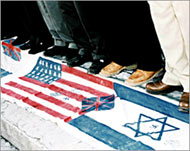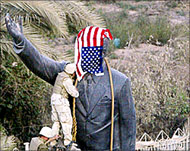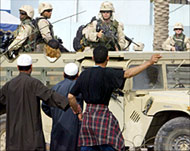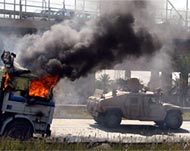US initiatives for reform
What is the US government’s vision for reform in the Middle East?

Why do many Arabs feel sceptical about that vision? What is the Greater Middle East Initiative? And is it possible to reform the Middle East while failing to stabilise Iraq?
Aljazeera.net put these and other questions to Danielle Pletka, vice-president for foreign and defence policy studies at the Washington DC based American Enterprise Institute for Public Affairs Policy (AEI), which is widely considered the pre-eminent rightwing thinktank in the US today.
Pletka, a leading neo-conservative, strongly supported the Bush administration’s war on Iraq and has served as a senior staff member for Near East and South Asia affairs with the US Senate Committee on Foreign Relations.
Aljazeera: When the US government speaks of reforms, what do they envisage and is that vision compatible with yours at the institute?
Pletka: Absolutely. When people talk about reforms, they are talking about the same thing.
The real question is execution. People outside government don’t have the same policy constraints that people inside government have.
|
“Sometimes it is necessary for the president to stand up with Bin Ali or Mubarak who are not models of democracy” |
At a thinktank I can be far more idealistic.
I would much rather not see President Bush stand up with President Bin Ali [of Tunisia] who is a human rights violator who has not enhanced democracy in Tunisia.
On the other hand, you have to recognise reality. Sometimes it is necessary for the president to stand up with Bin Ali or Mubarak or others who are not models of democracy.
The issue is not with the conception but the execution.
Aljazeera: So what is your idealistic vision of reforms, asides from politics?
Pletka: Ideally speaking this is a region in which there would be government accountability for the people.
The problem in the Middle East is one of perception. In other words, the way that it has been described by a lot of people seems to be much more foreign policy related than it is domestic policy related.
Democratisation has almost nothing to do with foreign policy and everything to do with increasing the accountability of governments to the people.
Aljazeera: How do you see the Greater Middle East Initiative? How is it any different from past official US visions for the region?
Pletka: It is hard to have a broad policy towards the Middle East because there is no such thing.
There are different countries and so, although I believe the initiative is a positive step and I think it will provide genuine hope for people in the Middle East who have not had much to hope for from their governments, I think it is going to be very difficult.
In the past we never talked about accountability in Middle East governments.
We never talked about the importance of democracy.
We talked about the strategic importance of various governments to the US and paid lip service to democratic norms but we were never willing to use the influence of the US as a superpower to lever governments toward reform.
 |
|
Pletka says Arab reform is not |
And I hope that is the big change.
Aljazeera: I’m not sure that you believe the Greater Middle East Initiative or other US initiatives are meant for any reason other than to advance US economic and strategic interests and now geo-political ones?
Pletka: That’s garbage. I don’t believe that. This is one of the most idealistic things the US government has done since the end of the cold war.
This poses every threat of not advancing our foreign policy interest. One-stop shopping with dictators is far simpler.
It is much nicer to go to one man, Bashar al-Asad, Hafiz al-Asad, Saddam Hussein or whoever, and say: “Here’s the deal, here’s how we want to do the business with you.”
You don’t have to worry about what the people like, or with dealing with the parliament. You don’t have to worry about anything.
Foreign-policy-wise, dealing with dictators is much easier.
What we’ve recognised is that, even though in the short term that may be positive, easier, in the long term, the disturbance to the broader population in the Arab and Islamic world is far more dangerous to us than any short-term gains that we might of had through one-stop shopping with dictators.
It’s very important that people understand that.
Aljazeera: So you are saying the ultimate beneficiary from reforms are Arabs, Muslims, but not necessarily the US government. The US government might in fact be losing.
Pletka: Right. If Arabs, if Muslims, because we’re talking about Iran as well, if the population of the broader Middle East doesn’t benefit, then the policy is a failure.
That is what it is about. It is not about making relations with Israel. It is not about loving America, it is not about any of those things.
|
“In the past we never talked about accountability in Middle East governments” |
It is about giving people hope for a better life, which in the long term will benefit everybody.
Aljazeera: Does it make sense to you that many Arabs are not buying this?
Pletka: Of course. I think it is incumbent upon the US government to put its money where its mouth is.
Aljazeera: Meaning?
Pletka: If we can do that, then they will believe in us.
If we can not do that, then they will not believe in us but it is not up to them, it is not an act of faith, you have to prove it.
The way you prove it is through action, not rhetoric. You start with rhetoric and that’s fair, but it is only by standing up for people’s rights.
It is only by saying to Husni Mubarak, to Zin al-din Bin Ali, to everybody, that, look: ‘Yes, we want a relationship with you but here’s what has to come along with that relationship: You need to have more openness, you need economic reforms, you need to do these things because otherwise your relationship with us will suffer, it will change and at the end of the day, it will end.’
That’s what we need to do.That’s how we will build credibility.
We are not helped by Aljazeera, Al-Arabiya, Al-Hayat and everybody else questioning all these things all the time.
But it is our job to prove it, not your job to believe us.
Aljazeera: Don’t you think that true reform in the Arab world will involve a more open and democratic media such as Aljazeera and therefore what we are doing contributes to that vision if it is indeed a sincere one?
Pletka: I’ve watched Aljazeera and Al-Arabiya.
I’ve spent a lot of time with the Arab media and one should not confuse freedom and irresponsibility.
I think of the New York Times as a free press even though I consider them to be biased.
 |
|
The AEI was a strong advocate |
I think Aljazeera and others have a political agenda that spills over into objectivity. That does a disservice to everybody.
In a free market, in a free media market, people will either believe or they won’t believe but I don’t consider a state-sponsored, state-owned media that is ‘free’ has the same standards we have here in the US or that they have in Europe.
Aljazeera: In a speech by President Bush early last year, the president said: “A liberated Iraq can show the power of freedom to transform that vital region.” You commented saying: “I really admired the president for having such a vision.”
Considering the war of attrition under way in Iraq, the hundreds of new casualties, mostly civilian, the killing of many US soldiers and other “coalition” soldiers, wouldn’t you say that Iraq now represents the last place that embodies the “power of freedom to transform that vital region”?
Pletka: Absolutely not. Iraq is going through a very difficult phase, but it is important that we consider the opposite premise, which is that things were better under Saddam Hussein.
Anyone who wants to make that argument is welcome to, but I don’t think they are going to get a lot of support in the Arab world, certainly not here in Washington.
Democracy, openness and freedom are not simple, easy things.
It’s not just about removing dictators. Democracy and representative government is a system, and a system requires constitutions, institutions.
It requires a significant amount of effort in building and that is not the process of a year.
|
“I’ve spent a lot of |
It wasn’t the process of a year in the US among westernised Christians in the 18th century and it is not the process of the year among Sunni, Shia, Kurds in 2003 and 2004.
It takes a lot of time and there are going to be setbacks.
And it requires commitment, on the part of the US but also on the part of the Iraqis and their neighbours.
All of us who believe in a free Iraq will be vindicated.
But if you want to look at it every day and point to every single time there is a problem, you can say this is a terrible idea.
Just as you could with every democratic experiment, including in the aftermath of the second world war.
Aljazeera: Speaking of “terrible ideas”, we are talking about Greater Middle East Initiatives at a time the US is in a quagmire in Iraq?
Pletka: I reject the premise that we are in a quagmire.
This is a process and should we really say to the 275 million other residents of the Middle East: “Sorry, we really only care about Iraq”?
We did a radio show with Iran last year at AEI and one of the things that one of the people said to us from Iran, was: “If you care about Muslims in Bosnia, in Kosovo, why don’t you care about us? If you care about Iraqi freedom, why don’t you care about us?”
The answer has to be that we care about everybody.
That doesn’t mean that every government gets overthrown, but it does mean that we have to make consistent efforts throughout the Middle East, in different ways. There’s no cookie-cutter approach in different ways to try and deliver on the hope of freedom for everybody in the Middle East.
|
|
|
Pletka rejects the idea that the |
We shouldn’t be putting Iraqis ahead of everybody else because that’s an injustice.
We should be trying for everybody in different ways.
Aljazeera: It is important to note that many Arab intellectuals, and people in the street, say that reforms cannot be coerced, cannot be installed from abroad. They have to come from within. What is your view?
Pletka: People who say things like that are in the service of dictatorial governments.
I noticed that the loudest voices who say that reform must come from within are people who have a vested interest in continuing the kind of governments that exist in the Middle East currently.
And that is, quasi-dictatorships, authoritarian state control.
If reform is not insisted upon from outside, even if it is delivered from within, then it will not happen. And we have plenty of precedents to prove it.
I don’t think you have a recipe that should come from Washington.
I don’t think the ideas should come from Washington, I don’t think the individuals should come from Washington, but if the pressure doesn’t come from Washington and, I hope, from Europe as well, if that pressure doesn’t come then reform will not happen.
Aljazeera: Can you elaborate on the European role?
Pletka: The main issue behind the idea of the Greater Middle East Initiative is to work in cooperation with the countries of the European Union to have a coordinated policy.
|
“That doesn’t mean |
I think they are very enthusiastic about the idea of bringing reform to the Middle East.
Aljazeera: So, you do not see their role as a mere rubber stamp, there is a vital role that Europe can play?
Pletka: If the Europeans don’t want to be part of this, then the United States has to go forward.
There is no question that the process will be greatly enhanced by European cooperation.
Does that mean if the Europeans say no, we don’t want to be part of it, we shouldn’t do it? No, it doesn’t.
But we all would benefit from greater European cooperation and I think there is a very strong recognition, including in Paris and Berlin, that that is the case.
Aljazeera: Do you think that the US, by pursuing reforms in the Middle East, is veering off its military solutions to the region’s problems?
Pletka: This is such a biased question. The US doesn’t have an agenda for military solutions to the Middle East.
Aljazeera: So how do you explain Iraq?
Pletka: I explain Iraq by saying that after 12 years it became obvious that there was really no other way to get rid of Saddam Hussein.
And that that was the right thing to do, but that is not the case in the rest of the Middle East.
And, while the option, as the president said last night [at a televised press conference on 13 April], has to remain on the table that does not mean that the military solution is the answer to the problems of the Middle East.
To the contrary, in most cases, including even perhaps in a place like Iran, it is not the solution.
 |
|
Pletka says the US should work |
We need to work with the people to leverage better government.
We do not need to do it from the point of a gun.
We do not want a better life for the Arab world more than the Arab world wants it for itself.
This should be a cooperative process between the US and the people of the Middle East, not the governments, but the people.
If it can be that, it will succeed, that’s not a military answer, that is a human answer, and I think that that is at the root of the president’s policy.
